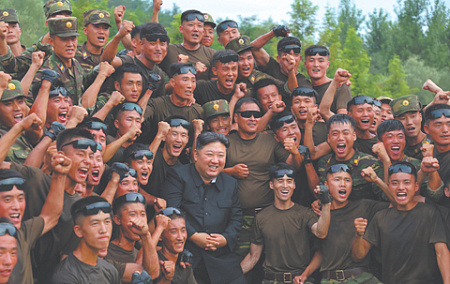
North Korean leader Kim Jong Un has signaled a dramatic shift in foreign policy, offering a potential path to dialogue with the United States while formally abandoning the goal of reunification with South Korea. Speaking at the Supreme People’s Assembly, Kim laid out a new formula for regional stability: Pyongyang would consider talks if Washington abandons its “absurd obsession” with denuclearization and accepts North Korea’s reality as a nuclear-armed state. In exchange, he suggested, the two Koreas could coexist peacefully as separate, sovereign nations.
This declaration marks a definitive end to the decades-long pursuit of a single Korean state from Pyongyang’s perspective. “How can we achieve unification with South Korea?… We will never become one,” Kim stated, as quoted by the state-run Korean Central News Agency (KCNA). He further announced that North Korea’s laws would be amended to define the South as a separate state, cementing a “clear border” between them. This harsh rhetoric, which includes flatly ruling out any talks with Seoul, starkly contrasts with recent conciliatory measures by South Korea’s new president, Lee Jae-myung, who had taken office with a promise to improve inter-Korean relations.
While closing the door on Seoul, Kim appeared to open one for Washington, specifically referencing his past diplomacy with former U.S. President Donald Trump. He surprisingly mentioned having “warm memories” of their three meetings in 2018 and 2019, a period of unprecedented direct engagement that ultimately stalled over sanctions relief and the scope of denuclearization. This overture is widely seen as an appeal to a potential future Trump administration, which had previously shown a willingness to engage with Kim on a personal level.
Pyongyang has summarily dismissed Seoul’s recent goodwill gestures, such as halting propaganda broadcasts, as insignificant. Kim’s powerful sister, Kim Yo Jong, accused the South of still harbouring ambitions to “absorb” the North. Persistent joint military exercises between the U.S. and South Korea also remain a major irritant, viewed by Pyongyang as rehearsals for war. In a notable policy adjustment following Kim’s speech, President Lee has reportedly indicated a new willingness to drop the demand for complete denuclearization if a future U.S.-North Korea agreement could at least freeze the development of new nuclear weapons, calling it a more realistic goal.
According to analysts, North Korea’s new stance is backed by a position of increased strength. The country enshrined its status as a nuclear power in its constitution in 2022, making any discussion of disarmament a non-starter. Expert Konstantin Asmolov, from the Center for Korean Studies, notes that Pyongyang’s negotiating power has grown substantially since the last round of talks, thanks to significant advancements in its missile arsenal and deepening ties with Russia, which have blunted the impact of international sanctions.
Kim’s announcement, delivered ahead of the APEC summit in South Korea, seems designed to reframe the diplomatic landscape entirely. The core message is clear: any future dialogue will not be about disarmament, but about arms control. For negotiations to move beyond mere formalities, experts conclude that Washington will have to be prepared to offer serious concessions, fundamentally altering its long-standing policy of demanding the complete, verifiable, and irreversible denuclearization of the Korean Peninsula.
